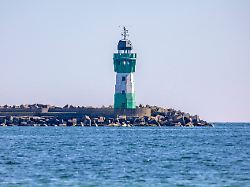Port of Mukran as a new location
The federal government moves away from the LNG terminal in front of Sellin
03/22/2023, 4:56 p.m
On the Baltic Sea island of Rügen, which lives from tourism, there is massive resistance to the construction of an LNG terminal off the coast. In view of the protests, the state government is now moving away from the project. The federal government is now considering an alternative location.
In view of the great resistance, Federal Minister of Economics Robert Habeck is moving away from the controversial liquefied natural gas terminal off the coast of Rügen near Sellin. The Ministry of Economics is examining the Mukran port near Sassnitz as an alternative to Sellin and prefers Mukran based on the current status of the tests. A decision should be made promptly.
Despite protests from the population and rejection by the state government, the first work on the construction of a terminal with two jetties for special ships for landing liquefied natural gas (LNG) started on the weekend before Sellin.
So far, the construction of two offshore platforms is planned, on which special ships for landing LNG are to be moored. After the terminal officially opened in Lubmin in mid-January, it would be the second in Western Pomerania. There is strong resistance from the communities and the population to the plans for Rügen.
Startled by the resistance, the state government also gave up its initial support for the federal government’s plan to build more terminals about five kilometers from the seaside resort of Sellin. Prime Minister Manuela Schwesig had called for alternatives. The federal government must first clarify the question of whether additional terminals in front of Rügen are still necessary. Environmental groups deny this.
For years, the port of Mukran, which claims to be the easternmost deep-water port in Germany, was the starting point for laying the Nord Stream 2 Baltic Sea pipeline, which has since been shut down. Several offshore wind farms were also built from there. From the port there are ferry connections to Scandinavia – for example to Trelleborg in Sweden and Rönne in Denmark. During the GDR era, the ferry connection to Klaipeda, which is now Lithuanian and then Soviet, was put into operation.
